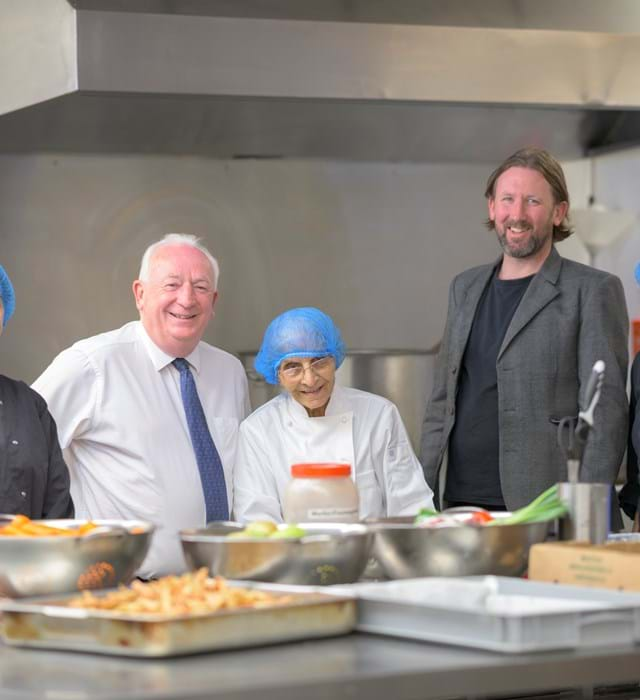Muller Group was started in London in 1926 before its office was destroyed during the Blitz, leading to a move to the market town of Cleobury Mortimer near Shrewsbury, as the company manufactured components for the war effort during World War II.
Cleobury Mortimer continues to be the group’s administrative headquarters and further divisions have been added, including Muller Redditch, which is its CNC machining Centre of Excellence in Bartleet Road on the Washford Industrial Estate in Redditch.
Muller Redditch provides high-volume complex components by utilising state-of-the-art technology across a wide range of multi-axis lathes and machines for a range of sectors, including automotive, defence, gas, electric, hydraulics, electrical, and healthcare.
The business wanted to solve a quality compliance problem and contacted Made Smarter West Midlands who provided a grant towards a multi-functional inspection rig.
Adam Cunningham, Managing Director of Muller Redditch, said: “Made Smarter has been first class and their support has been really important.
“We have now reduced the risk of sending non-conforming parts to our major customer and it has increased our productivity.”
Muller Redditch is one of the UK’s premier sub-contract machining facilities for low to high volume CNC machining.
They had a recurring problem due to occasional human error with its complex precision parts for a major automotive customer.
The business, which is part of the Manufacturing Assembly Network (MAN), heard about Made Smarter West Midlands through WMG at the University of Warwick, which is one of Made Smarter’s strategic partners.
Adam was put in touch with Jit Gatcha, Digital Transformation Specialist at Made Smarter West Midlands for the Black Country, who organised for WMG to create a digital roadmap for the business.
Adam explained: “We have a centreless grinding process as part of our automotive business and we were having production issues because we produce so many parts per hour, per day.
“The cycle time is five or ten seconds to carry out the process and we were finding that if we supplied 15,000 parts in a week, every few weeks there would be one part that wasn’t ground out correctly or something was wrong with the dimensions.
“Any defective part in the system stops our customer’s automated robotic assembly line, with significant costs are incurred.
“We therefore needed to find a solution as the process was robust apart from occasional human error where an operator would accidentally put an unfinished component in with the finished parts, so we needed equipment that would 100% eliminate this issue.”
Jit Gatcha said: “The ethos of Made Smarter West Midlands is to help SMEs in the engineering and manufacturing sector to embark or continue on their digital journey.
“One of the key elements is providing access to experts who have vast experience to implement a digital programme to improve the efficiencies of their business who will visit and provide a digital roadmap.
“With Muller Redditch, we were able to provide a grant which is really important when SMEs are facing rising energy bills to resolve their production problem because this access to funding can make the difference between businesses going ahead with digital technology or having to put it on the back-burner for now.”
Adam applied for a grant of around £15,000 towards designing and manufacturing an inspection rig that contained all the features which Muller Redditch required.
“As this was the last process before sending the components to our customers, it needed to end up in the finished box in pristine condition,” he said.
“Once our parts are in this box, we didn’t want them to be touched by human hands again.
“Our process was capable apart from this last stage, so we worked with a tool maker on the design and then had it manufactured. We also invested £20,000 in the inspection rig.”
Dr. Veer Angadi, Technology Transfer Engineer at WMG, said: “From the digital roadmapping workshop, we found out that the pressure on zero defects and high throughput in final quality stage was higher than ever before, considering the requirement is 100 per cent quality compliance.”
“We undertook the automation feasibility activity and discovered a business case which was indicating a payback period of less than 12 months.”
Muller Redditch now has faith in all its production processes and, just as importantly, so do its automotive clients.
Adam said: “It has taken 12 months to fully implement the system because it proved troublesome with manufacturing the rig and then installing it, but we are now at a stage where we are happy with it.
“In our CNC business we have a full MRP2 system and that digital footprint runs the business for us.
“Having the rig has reduced the risks of sending non-conforming parts to our major customer and we have invested in our productivity when you take into account the whole picture.
“It has had a huge impact on our main customer because we are no longer sending the odd part which is not what is required.
“If we hadn’t got the grant from Made Smarter, we wouldn’t have been able to move the design stage of the inspection rig to the next part of the process.
“We would have had to do a poorer version of the part, so Made Smarter’s support allowed us to evolve and develop the design to cover multiple functions.”
Adam said Made Smarter West Midlands had a vital role to play in helping engineering and manufacturing SMEs grow their digital technology and, in turn, grow their businesses.
He said: “SMEs like us need this kind of support and advice about which digital technology is best for our business and, when you are involved in the day-to-day operations of running a business, you aren’t always aware of the support that is available.
“Made Smarter has given us the help to focus on other areas that possibly we didn’t even consider previously, and their support has been invaluable.”








